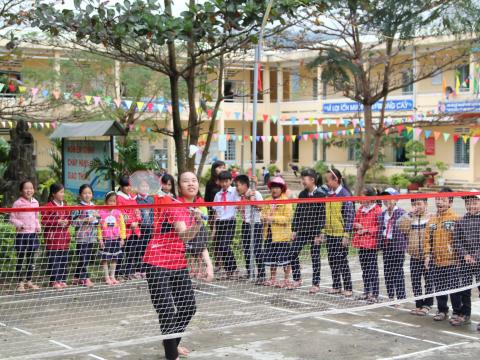What does badminton mean to Hang?

Thirteen-year-old Hang received first prize in the district-level badminton competition for five years, from grade four to eight.
“I like this sport because it’s a simple way to stay healthy and make more friends. The sport is easy to play and doesn’t cost much for us as we’re poor students in a rural area,” the eighth-grader says.
Hang lives with her parents at her grandparents’ home in the only rural district Hoa Vang of Danang city in Central Vietnam. Her mother, Hanh, is a school cook and cleaner. Her stepfather, Linh, is a casually employed mason. Her biological father left the family when she was three.
"I like this sport because it’s a simple way to stay healthy and make more friends."
“I often play badminton at my old primary school, where my mum works as a school cook and cleaner. I can meet my old teachers there. It’s just a few minutes’ walk from my home,” she continues. “Sometimes, I play the sport with my friend Ly from the village on some patches of grass in our village. We have a lot of fun there. But, it’s better to play badminton at school with a proper net and court.”
“I prefer the badminton court at my old primary school, where Ly is in grade five now. She has also won some badminton prizes at district level like me. And the young pupils are always the most excited spectators and supporters,” she explains more why her old school is her beloved venue for her sport.
“My favourite aspect of playing badminton is we can play it during school breaks and at home after class in our free time. Also, badminton is a simple sport for children who need to relax after class and it is an unhurried sport which doesn’t need much physical strength,” the girl convinces cheerfully.
“I became interested in this sport when I was young, about eight years old, by learning from my parents who play badminton every day for exercise,” Hang describes how. “At that time, I was in grade three. My primary school, which is just a few minutes’ walk from my home, still has a nice badminton court.”
"I became interested in this sport when I was young by learning from my parents who play badminton every day."
“My parents are very fond of sports, especially badminton and football. My dad even used his own money to buy some plastic balls for kids in my village to play for free. Every afternoon, my parents taught me and some friends of mine to play badminton at the school’s badminton court. Those were happy times. I’ve been very interested in badminton since then,” she reveals.
“We can play badminton for exercise every day,” the girl says about the benefits of playing the sport.
“Playing badminton is a healthy form of exercise for the whole body, from the head to the feet. We have to jog, run, jump, smash, bend, breathe, twist, hold the shoulders back and push forward the chest. Playing badminton means we’re healthy for school.”
“I will play badminton until the day I can’t run or jump. It’s good for my health,” the rural student discloses her long-term goal for playing it. “I will keep on doing sports activities at school and join a badminton club to become a good badminton player and then a good badminton coach for girls in my community.”
Hang’s parents and grandparents have attended World Vision training to ensure more food is available, especially wet rice, which is their main food. Like other villagers, they also received training in nutrition and home gardening to have more nutrients through vegetables and fruit trees.
In terms of kindergarten education, Hang is among the children in the community who have benefited from the early childhood care and development programme. Moving on to primary and secondary education, students have received training in life skills to reach their full potential through children’s club activities, such as annual school sports festivals.
“I don’t eat anything special to stay healthy for my simple sport. Rice is our main food. Normally, we eat rice with vegetables and fish. Sometimes, at a family gathering, we have big meals with pork and chicken that my mum buys at the commune’s market,” Hang reveals her regime.
“For me, having enough food to eat means staying healthy for my sport. If there’s no food, there won’t be any school or sports for any child. I want to say thank you to World Vision for its support in putting food on the dining tables of many families who were once malnourished in our community,” the five-consecutive-year-badminton winner says.